| |
|
Thursday, May 29 Lipinsky Family S.D. Jewish Arts Festival


Tuesday, June 3 Guardians Golf & Tennis Tournament


Thursday, June 5 Tifereth Israel's 'Girls Night Out'


Friday-Saturday, June 6-7 JFS~Judaism on the Wild Side


Sunday, June 8 Temple Solel~Tikkun Leil Shavuot


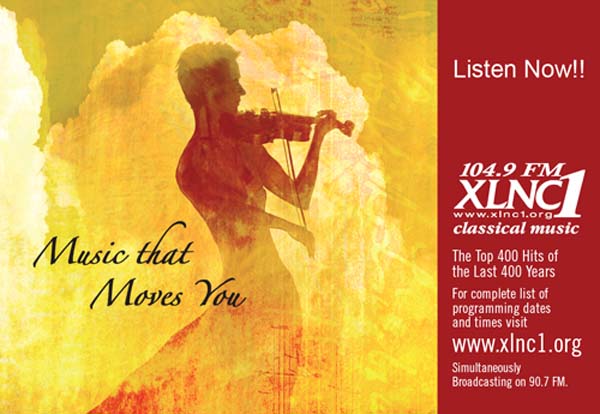

THE VIEW FROM JINSA
Israel-Syria deal wouldn't sweep away Iran
By Shoshana Bryen
 WASHINGTON, D.C—
It was in the Jewish Telegraphic Agency e-mail update: U.S., Iran are new obstacles in renewed Israel-Syria talks: "In their sixth major peacemaking effort since 1991, Israeli and Syrian negotiators face all the old issues - borders, security arrangements, the nature of the peace, water, timetables - and two new ones: Iran and the U.S." WASHINGTON, D.C—
It was in the Jewish Telegraphic Agency e-mail update: U.S., Iran are new obstacles in renewed Israel-Syria talks: "In their sixth major peacemaking effort since 1991, Israeli and Syrian negotiators face all the old issues - borders, security arrangements, the nature of the peace, water, timetables - and two new ones: Iran and the U.S."
There was more, but just this much made us ill. There we are - obstacles. If only the United States would get out of the way, Israel could make peace with Syria and everything would be just fine and dandy. Yes indeed. "Iran and the US," those well-known twin obstacles.
Excuse the bitterness; it was just a journalist, albeit one working for JTA. But Syria presents a problem too important to let pass the idea that the United States has some devious interest in preventing Israel from reaching a secure peace with a willing neighbor. Or that Iran and the United States are simply flip sides of a coin.
 According to Ha'aretz, Brig. Gen. Yossi Baidatz, head of the IDF Military Intelligence's Research Division, told a Knesset Committee this week that, "in his view, Syria was not really considering changing its attitude toward Iran... despite diplomatic contacts with Israel. He added, however, that he felt that the Syrians were earnestly interested in advancing the peace process with Israel. The intelligence chief went on to say that Hezbollah was continuing to enhance its rocket capability both north and south of the Litani River. 'The rockets are coming in from Syria and Iran,' Baidatz said." According to Ha'aretz, Brig. Gen. Yossi Baidatz, head of the IDF Military Intelligence's Research Division, told a Knesset Committee this week that, "in his view, Syria was not really considering changing its attitude toward Iran... despite diplomatic contacts with Israel. He added, however, that he felt that the Syrians were earnestly interested in advancing the peace process with Israel. The intelligence chief went on to say that Hezbollah was continuing to enhance its rocket capability both north and south of the Litani River. 'The rockets are coming in from Syria and Iran,' Baidatz said."
Despite the seeming contradiction (Syria is aiding Hezbollah and won't give up its relationship with Iran but is "earnestly interested in advancing the peace process with Israel") Baidatz nails the crucial point. Syria is not interested in peace or in Israel, and the Golan Heights is the third of three Syrian priorities (the other two are to maintain the regime in Damascus and maintain control of Lebanon). Junior Assad wants to end Syria's estrangement from the United States in order to strengthen his hand at home and get rid of the UN's Harriri assassination probe. A "peace process" with Israel would engage the Americans and give the United States a stake in the future of the Assad government. The United States does it for the Palestinians, with the added benefit - from the Syrian point of view - that Israel finds itself under some pressure. Assad wants to be Abu Mazen.
U.S. policy toward the Palestinians leaves a great deal to be desired, but it has been clear, even to the State Department, that Syria isn't the Palestinians. Syria is a country that sponsors terrorism and assassination, undermines Lebanon's elected government, opens its border with Iraq to al Qaeda and other forces attempting to undermine the Iraqi government and kill Americans, and is trying to acquire nuclear technology from North Korea. All of this it does with the help and support of Iran. This is not the prom, where Israel cuts in on Iran and waltzes Syria away to a rosy future paid for by the United States.
A secure peace between Israel and Syria is to be desired. But one that relies on the premise that Syria will dump Iran and leave Lebanon, and that comes at the expense of American interests in Lebanon and Iraq, by its nature cannot be secure. If that makes the United States an "obstacle" to Syrian or Israeli fantasies, so be it.
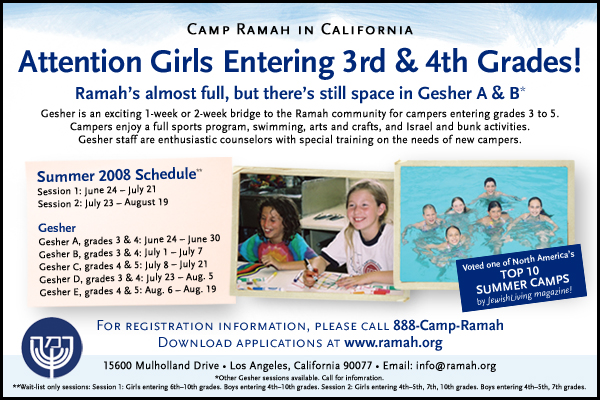

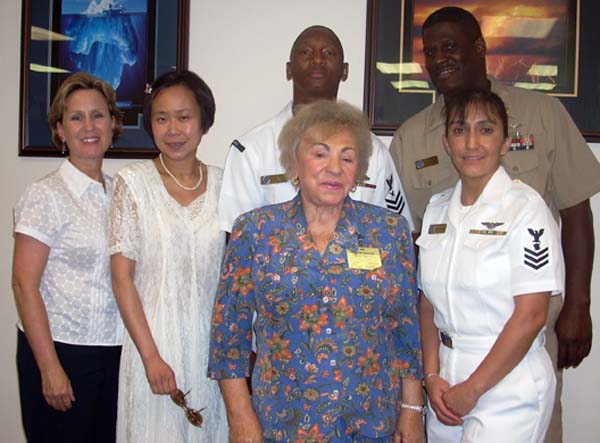
Naval Supply Center hosts Holocaust survivor at remembrance days observance
By Janet Tiger
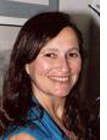 SAN DIEGO—For 40 years, Holocaust survivor Gussie Zaks has been telling her story – sometimes to two groups a day. But this last month had Zaks, president of the New Life Club, facing eye surgery, forcing –the cancellation of 10 different speaking engagements. SAN DIEGO—For 40 years, Holocaust survivor Gussie Zaks has been telling her story – sometimes to two groups a day. But this last month had Zaks, president of the New Life Club, facing eye surgery, forcing –the cancellation of 10 different speaking engagements.
But Gussie didn't cancel her talk at the “Days of Remembrance for Victims of the Holocaust” sponsored May 21 by the Diversity Awareness Committee and commander of the Navy Supply Center, known by the military acronym of COMFISCS .
As she looked at the patriotic display leading to the Broadway Conference Room where Leslie Jenné, COMFISCS's diversity program manager, had organized the event, Zaks commented that the colorful flags reminded her of the troops who liberated her at the Bergen-Belsen Concentration Camp.
Usually Yom Hashoah and U.S. Memorial Day are three to four weeks apart, and sometimes more than a month. But this year, the two days fell closer together, and the COMFISCS 'Days of Remembrance' captured the connection by having Zaks serve as the guest speaker.
Navy Capt. Andrew J. Turnley brought the spirit of the two days together by reminding members of the audience how they felt after 9/11 – and asking them to think what it must have been like for Zaks and others during World War II to endure that type of horror for six years.
Harpist Hong Liang set the tone with Hebrew melodies including Passover songs and other prayers. There was a moving lighting of memorial candles before Zaks was introduced by Petty Officer First Class Fran Malone. The standing room only crowd was attentive and the questions included queries as to how Gussie could survive such tough times. Her response : "I grew up in Poland – it was a tough country."
Another asked her if anyone had ever been nice. Her answer: 'rarely.' When she was starving in one of the work camps, why didn't she run away to a neighboring town? 'Who would open their door to a Jew?' Zaks responded.
The final question from the audience 'what should we take away from your talk?' Her answer – 'You must tell your families so that this will never happen again."
The detailed event program included Dwight D. Eisenhower's prophetic words – "Get it all on record now – get the films – get the witnesses – because some day down the track of history, some bastard will get up and say that this never happened."
Zaks’ presentation was filmed by the Navy Fleet Public Affairs Pacific for possible zworldwide broadcast via the Navy's Internet webcast systems. Zaks calls herself a 'change of life' baby and even now, in her eighties, she is changing lives, working with troubled teens.


PEOPLE OF THE BOOK
The Jewish boy who became a Nazi mascot
By David Strom
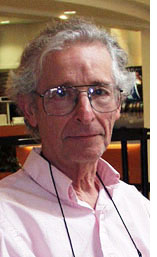 SAN DIEGO—What do you get when you mix an amazing Holocaust survivor’s story with a mystery tale? You get the book Mascot. This is one of the best books I have read in the past several years. It is a book that once picked up is difficult to put down. SAN DIEGO—What do you get when you mix an amazing Holocaust survivor’s story with a mystery tale? You get the book Mascot. This is one of the best books I have read in the past several years. It is a book that once picked up is difficult to put down.
In May of 1997, Mark Kurzem was a graduate student at Oxford in England. Unexpectedly, Alex Kurzem, Mark’s father who lived in Australia, showed up at his apartment. Why? Just a few days before Mark spoke over the phone with his mother and father in Melbourne, Australia. At that time there was no hint that either parent contemplated coming to England. With the surprise appearance of his dad, Mark’s antennae went whirling trying desperately to catch any wavelength that might help him figure out the reason for his father’s sudden arrival at his home in Oxford.
For some mysterious reason, Alex Kurzem had told his wife in Australia that he was in Sydney visiting a sick friend. Only after getting Mark’s word that he would not tell his mother that Alex was in England, he began slowly, in bits and pieces, to tell his life story. The life Alex lived as a youngster shocked Mark.
 In the fall of 1941, when Alex was five years old, he ran away into the forest near the town of his birth. From high up, he peered down upon the Nazis who were slowly marching Jewish men, women, children and babies towards their death. He had to bite his hand so as not to cry out and be caught while he witnessed the slaughter of his mother, younger brother and infant sister. He remembered on the day before the erasure from the map of this quiet Jewish shetl, when his mother told him they were going to be murdered the next day and that he should hold the hand of his younger brother and baby sister as they were being led to their death. How did she know they were going to be annihilated? He recalled his mother telling him that his father was dead. Yet, he thought he saw his father just a day or two earlier. Why would she tell him his father was dead? In the fall of 1941, when Alex was five years old, he ran away into the forest near the town of his birth. From high up, he peered down upon the Nazis who were slowly marching Jewish men, women, children and babies towards their death. He had to bite his hand so as not to cry out and be caught while he witnessed the slaughter of his mother, younger brother and infant sister. He remembered on the day before the erasure from the map of this quiet Jewish shetl, when his mother told him they were going to be murdered the next day and that he should hold the hand of his younger brother and baby sister as they were being led to their death. How did she know they were going to be annihilated? He recalled his mother telling him that his father was dead. Yet, he thought he saw his father just a day or two earlier. Why would she tell him his father was dead?
After witnessing the death of all the Jews of his small village, Alex fled deeper into the forest. During the day he foraged for food and searched for a safe place to hide, knowing that he had to avoid the Nazis and many of the peasants. He trusted no one. At night, he slept in the woods. Night sounds frightened him. He tied himself high up to the trees to avoid animals that roamed the forest.
For months, in the dead of winter, he hid himself from all humanity. He talked to no one. Finally, some Latvian soldiers caught him. The Latvian soldiers, most of whom were ruthless and heartless killers of Jews, took Alex and made him their mascot. Why? An individual sergeant discovered, as he pulled Alex’s pants down, that Alex was a Jewish boy. For unknown reasons, he took pity on Alex. The sergeant told Alex never to take off his clothes around the rest of the soldiers and must never go to the bathroom in front of the men. He learned that he had to be very guarded with his body or else he would be murdered.
Alex, the mascot, became somewhat famous. He was used in a Nazi propaganda film. The film showed him playing with other children at the beach wearing his made to fit SS uniform, and just being so happy living in the Nazi “utopia.” Underneath it all, although he felt safe with his comrades in arms, he felt sad. He witnessed the slaughter of Jews caught in hiding. He saw synagogues filled with Jewish men, women, and children burned to the ground. He watched the Latvian Nazis torture and than murder their victims. Nightmares of those events followed Alex for the rest of his life.
The Latvian commander of all the troops in the area decided to have Alex adopted by a friend of his. The friend was married with several daughters and wanted a son very badly. Alex, however didn’t want to leave his Nazi buddies, so he gave his adopted parents “hell.” Even though he was less than ten years old, he did not want to go to school. He enjoyed his army life and hated schooling. He skipped school, disrupted class when he went and failed his subjects. Finally, he was sent back to his “comrades in arms” at the Russian front.
As the tide of the war turned in favor of the Allies, Alex was sent back to Latvia and his adopted family. Now, he was happy to be home and going to “home school” but the war caught up to him and his adopted family. All of them moved to Germany. The contrasts between his life in Latvia and in Germany were striking. Although he had lived in “luxury” in Latvia, he lived in poverty in Nazi Germany. His adopted father was able to make a good living in Latvia, but he barely eked out in Germany. Alex, the young Jewish Alex, was the person who was able to put food on the table for all to eat. He had learned “street smarts” while hiding and foraging in the forest of Latvia. These skills now came in handy.
In 1948, Alex moved to Australia with his adopted Latvian family along with many other Latvians. Alex’s adopted father, along with the Latvian commander that Alex knew, were former Nazi collaborators trying to escape prosecution for their war crimes and Australia did not ask too many questions.
After a few years, Alex married. His new wife did not know he was Jewish. He still kept in contact with his adopted family, raised his own family and never revealed his background to them. This is the way it stayed for over fifty years until the day he appeared at his son’s apartment in England.
What I have described in this review is only half the story. The other half is Mark’s research into his father’s past. Slowly Mark was able to take the pieces of Alex’s past and place them into a coherent puzzle that is unbelievable and yet, true! The equation to the powerful impact of this book is this: The Holocaust + mystery + well-written = Mascot.


THE JEWISH CITIZEN
Songwriter versifies about religion, food, loneliness—'whatever is happening'
Over the last several weeks, San Diego Jewish World has been publishing songs composed by Hal Wingard that touch upon Jewish topics, but starting with this issue we are posting his songs bearing on other subjects. We plan to continue doing so until we’ve been able to share with our readers his complete works.
By Donald H. Harrison
 SAN DIEGO--Have you ever been forced to spend hours alone, say in an airport, a restaurant, or hotel? For many of us, the lonesome hours are the down side of business travel, penalties that we must pay as we pursue our careers. For Hal Wingard, 82, a retired educator who spent many years developing ways to teach students to speak second languages, these hours proved to be some of his most creative. They afforded him time just to think, muse, and sometimes, to compose. SAN DIEGO--Have you ever been forced to spend hours alone, say in an airport, a restaurant, or hotel? For many of us, the lonesome hours are the down side of business travel, penalties that we must pay as we pursue our careers. For Hal Wingard, 82, a retired educator who spent many years developing ways to teach students to speak second languages, these hours proved to be some of his most creative. They afforded him time just to think, muse, and sometimes, to compose.
Wingard’s journey into music performance began early in his career in the 1950s when he was an English teacher at John Burroughs Junior High School in Los Angeles. Rather than having students just read English poetry, sometimes he would have them sing ballads like “Lord Randall” with him, while accompanying the class on an old auto harp. His wife, Eileen, a music teacher, purchased a second-hand guitar for him, and, when Hal began to teach high school German, he expanded his repertoire into foreign-language ballads.
After teaching in Germany as a Fulbright exchange teacher, teaching at an American school in France, and serving as an instructor in German at Los Angeles City College, Wingard transitioned in 1962 to the phase of his career for which he became well known among California educators. He became a teacher of teachers, a developer of techniques for the teaching of foreign languages, first with the Los Angeles City Schools and from 1966 through 1985 with San Diego City Schools. For many years, he served as executive director of the California Language Teachers Association.
Wingard recently reflected on his career and his songs during an interview at his home in the Del Cerro section of San Diego. He was joined by Eileen, who after her teaching days had become a symphony violinist, music lecturer and reviewer.
One of Hal Wingard’s favorite techniques for stimulating foreign language teachers was to take them on weekend retreats, where in groups they would participate in situations in which they would be forced to converse in whatever foreign language that they taught—situations that could later be re-created in classrooms for the benefit of students. Wingard wanted to wean the teachers from having students simply memorize vocabulary and grammar rules, and instead to get them to teach language as “a natural function of usage.”
Wingard was invited to conduct similar seminars for other school districts around the state, and from 1975 to 1980 served as a member of the California State Curriculum Commission, which set classroom standards in various subjects, including languages.
“So I was doing a tremendous amount of travel, and I would have a lot of time on my hands to do nothing,” Wingard recalled. “So I am sitting in a restaurant. It is evening. Nobody is talking to me, and I am not talking to anyone, and there is a sign that says 'exit.'
“Exit, that is a song, so right there I am writing the lyrics, and sometimes melodies would come,” Wingard said. “There was nothing I could do to stop it. Once I started writing songs nothing could keep me from writing songs. One song would lead to another song, and they would be about whatever was going on, whatever was happening.”
"Exit" was written January 27, 1978. If you want to hear Wingard {pictured below} singing it or any of the other songs mentioned in this article, click on the respective title.
# 35 Exit
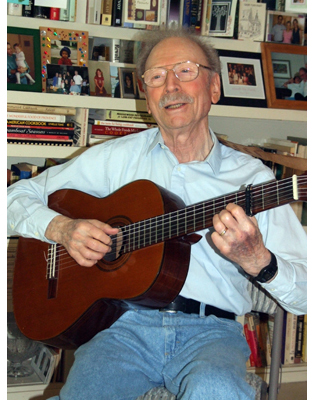 You're dancing with the girl you choose, You're dancing with the girl you choose,
Then step upon her brand new shoes.
Exit. Exit. E. . . . . . . . .xit.
With friends you've sat and drunk your fill;
The waiter comes to give the bill.
Exit. Exit. E. . . . . . . . .xit.
Fly the coop, escape, and go.
Get away, and don't be slow.
In craps at last the pot is yours,
When cops come pounding at the doors.
Exit. Exit. E. . . . . . . . .xit.
Your lover says she has no zeal,
Because you've lost your sex appeal.
Exit. Exit. E. . . . . . . . .xit.
Fly the coop, escape, and go.
Get away, and don't be slow.
The lady's eyes invite romance;
Her husband sees you make advance.
Exit. Exit. E. . . . . . . . .xit.
You've sung your song and when you pause,
The list'ners sit without applause.
Exit. Exit. E. . . . . . . . .xit.
“Don Pepito’s Place” is a song “about a Mexican Restaurant, where I was alone and next to me were a group of males, and they were having a ball, telling jokes, and I reflected upon how I felt being an outsider and how they knew Spanish and I didn’t know Spanish." Words were composed September 26, 1996, on a flight between Bakersfield and San Diego, with an intermediate stop in Los Angeles, after Wingard had a lonely meal at the namesake Mexican restaurant in Bakersfield. He completed the music on October 8.
# 259, Don Pepito's Place
I sit at Don Pepito's Place
Picking at my food,
While you at tables next to mine
Enjoy a festive mood.
I'd so much like to join with you,
You of Spanish tongue,
But Spanish still remains for me
A song I haven't sung.
While you with friends connect to chat,
Laughing as you speak,
My dumbness means that I must miss
Connections I would seek.
If only language could be learned
Through friendly, festive means,
While sitting at Pepito's Place
And eating refried beans!
But, no, it doesn't work that way.
So, though I know the food,
I still must eat my refried beans
Outside your festive mood.
It's true: I'd like to join with you,
But simply don't belong,
For Spanish is your melody,
And I can't sing your song.
Another song, “Ratatouille," was suggested to Hal by the rhythm of his own footsteps as he walked on December 16, 2002 through Los Angeles International Airport to take a flight to San Jose. He cheerfully dedicated the song to his niece Cherina Eisenberg, "the only real chef in the family." Sometimes, said Wingard, "melodies suggest topics and topics suggest melodies and the best songs are when there is a marriage.”
#305, Ratatouille
A Study in Haute Cuisine
Of all my fav'rite dishes
I find the most delicious
Is ratatouille.
Rata, rata, ratatouille.
Ratatou, ratatou, ratatouille,
Ratatou, ratatou, ratatouille,
Ratatou, ratatou, ratatouille,
Ratatou, ratatou, ratatouille.
When giving dining wishes
My order repetitious
Is ratatouille.
Rata, rata, ratatouille.
Chorus
Gooey ratatouille.
Stewy ratatouille.
Chewy ratatouille.
Mildewy ratatouille.
The fact is not fictitious.
The dish that's most nutritious
Is ratatouille.
Rata, rata, ratatouille.
Chorus
As lyrics previously published by San Diego Jewish World in the column “Thursdays with the Songs of Hal Wingard,” demonstrate, the composer has great respect for Jewish tradition and customs . At the same time, he describes himself as a “disbelieving Jew,” one who thinks that God is man’s invention rather than vice versa.
Unlike the songs that come to him in the spur of the moment, other songs reflect his desire to convey his point of view about religion, one that has developed over a lifetime. In particular, these include “Hymn: The Marvel of Mankind,” which he dedicated January 2, 1978, to Danny, his son; and two “Dragonist” songs, in which he “creates a whole mythology.”
#29, Hymn: The Marvel of Mankind
I wonder how a sparrow
Can build a perfect nest.
I marvel how a river
Carves canyons in the West.
I wonder how the sunshine
Makes redwoods grow so tall;
But how mankind can make a god
Is wonder of them all.
The rain can take a boulder
And grind it into sand.
The spring in warming winter
Spreads flowers 'cross the land.
And lightning in the forest
Can spark a giant flame;
But only man can make a god
And glorify its name.
I marvel so at mankind.
I proudly sing man's praise.
No other part of nature
Compares to mankind's ways.
No single other creature
Can do what man can do:
Create an awesome, mystic myth
And make believe it's true!
I wonder how a sparrow
Can build a perfect nest.
I marvel how a river
Carves canyons in the West.
I wonder how the sunshine
Makes redwoods grow so tall;
But how mankind can make a god
Is wonder of them all.
Ah, man!
Wingard began writing his first Dragonist song, "Sermon" on March 23, 1992 on a flight from San Diego to San Francisco and completed it two days later.
#221, Sermon
In the Beginning
We're gathered at the seashore
Where nothing used to be,
'Til Dragon, for diversion,
Created land and sea.
Alone She roamed the landscape
And often took a dip;
But still, She felt a lacking.
Existence had no zip.
Hallelujah.
One day upon a meadow,
She raised Her head and roared:
"I'm Universal Mistress--
Almighty--yet I'm bored."
"I'm sick and tired of swimming.
I've had my fill of walks.
I need a new diversion,
A kind that thinks and talks."
Hallelujah.
And so She mixed a moonbeam
With essence of the sea,
Creating man and woman--
Plain folks like you and me.
But humans, being human,
Began to act like fools.
So Dragon soon decided
She had to make some rules.
Hallelujah.
She climbed the highest mountain,
Spewed Words across the sky--
Flames of fiery Wisdom--
For mankind's living by.
Now I must spread the Wisdom
Of Dragon's flaming Word,
Converting non-believers
To Truth that must be heard.
Hallelujah.
Now I must walk the valleys
That once were Dragon's path;
And I must bathe in waters
Where Dragon once took bath.
I follow Dragon's footsteps,
Submit to Her control,
Knowing Her protection
Safeguards my fragile soul.
Hallelujah.
Oh, Dragon, mighty Dragon,
I feel You ev'rywhere.
And yet so many people
Failed to see You're there.
Hallelujah.
Hallelujah.
The San Diego composer returned to his "Dragonist" theme a year later, March 28, 1993, while staying at Santa Sabina Pract-Inn. He playfully dedicated it to his "faithful fellow Dragonists."
#230, Commentary on the Sermon
You say that your Dragon commands from Her throne,
Ruling the world by cellular phone,
Directing each Dragonist woman and man
To honor the Dragon and follow Her plan.
You wish you were free, but know that you're not
Your Dragon controls any will that you've got.
Your Dragon determines, leaves nothing to chance.
It's She calls the music that leads you to dance.
You say that your Dragon commands from Her throne,
Ruling the world by cellular phone,
Directing each Dragonist woman and man
To honor the Dragon and follow Her plan.
Your Dragon is with you--you know this for sure--
Whether you're rich or penniless poor,
Whether you're doctor or streetwalking whore,
No matter what side is yours in a war.
You say that your Dragon commands from Her throne,
Ruling the world by cellular phone,
Directing each Dragonist woman and man
To honor the Dragon and follow Her plan.
You shower your Dragon with honor and praise,
Despite all the painful pranks that She plays.
And if you get burned by the fire that She spits,
Remember, it's you built the throne where She sits.
You say that your Dragon commands from Her throne,
Ruling the world by cellular phone,
Directing each Dragonist woman and man
To honor the Dragon and follow Her plan.
In our interview, Wingard said he believes that “we make our own lives; we are not governed by some force. It is conditions—even our genes and how they are constituted—that make a difference.”
The songwriter added that he is particularly appalled when, at disasters, people will “thank God” that they survived. If God was responsible for their survival, was God not also responsible for the deaths of the other people who died horribly?
“Should I say ‘thank God for the cancers’—I have had two of them—I should be grateful?”
Wingard’s wife, Eileen, has different views on religion, which resulted in the couple creating their own family Haggadah for conducting Passover seders. The Hebrew portions include traditional prayers, which Eileen will recite, but from which Hal refrains. The English portions do not mention God.
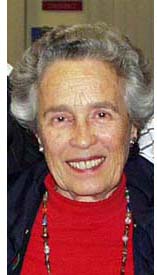 As Eileen (pictured at right) has a Phi Beta Kappa in music, I asked her to comment on Hal’s compositions. “Most of them have a folk idiom influence,” she replied. “He writes melodies in different styles. Some have a country western twang, some have a Russian influence, or Jewish, Hebrew influence—a lot of them are in minor.” As Eileen (pictured at right) has a Phi Beta Kappa in music, I asked her to comment on Hal’s compositions. “Most of them have a folk idiom influence,” she replied. “He writes melodies in different styles. Some have a country western twang, some have a Russian influence, or Jewish, Hebrew influence—a lot of them are in minor.”
Smiling at her spouse of 55 years, she said: “I can’t say there is a lot of great originality à la Leonard Bernstein, but I think many of his songs are as good or better than a lot of pop music today and even historically. They are sing-able, they fit the words nicely, and most people who hear them enjoy them.
“Some songs are better than others in terms of originality, range and expressiveness but most of them pair well to the words,” she added. “What is a song but the music should enhance the lyrics? That is the primary goal of a song, I think.”

ADVENTURES IN SAN DIEGO JEWISH HISTORY
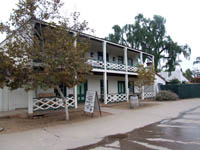
Robinson-Rose House
|
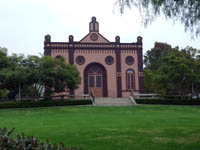
Old Temple Beth Israel |
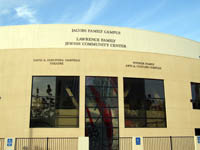
Lawrence Family JCC |
Editor's Note: We are reprinting news articles that appeared in back issues of various San Diego Jewish newspapers. You may access an index of the headlines of those articles by clicking here. You may also use the Google search program on our home page or on the headline index page to search for keywords or names.
Jewish Labor Committee
From Southwestern Jewish Press, July 11, 1946, page 3
By Ben Feinberg
The supper and food collection sponsored by the Jewish Labor Committee on Sunday June 30th at Beth Jacob Center turned out to be a huge success.
Realizing the responsibility to their hungry and destitute brrethren in Europe, the Jews of San Diego responded wonderfully.
The supper was deliciously prepared by our very capable committee consisting of Mrs. Adler, chairman, with Mrs. Feinberg, co-chairman, and Mesdames Shelley, Lazarowitz, Penn, Fleischman, Herscovitz, Sarfan and Margolis.
We take this opportunity to thank all the participants and committees who so generously contributed food and labor to make this affair successful.
USO-Jewish Welfare Board
From Southwestern Jewish Press, July 11, 1946, page 6
Chaplain Samuel Sobel was a guest at the Kosher Supper held Friday at the Tifereth Israel Synagogue, 18th and Market Street. Another visitor was Mr. Simon Abrahams, regional supervisor of the National Jewish Welfare Board in San Francisco. Rabbi Ephraim Siegel conducted the services and delivered an interesting sermon dealing with the Portion of the Week. A number of Army personnel who are stationed on the Strand were "first time" guests. In spite of the food shortage, a delicious home-cooked meal was served by our faithful committee, headed by Mrs. Lena Jacobson and Mrs. Ruth Douglas.
Sunday Discussion Hour brought out the lively topic of Anti-Semitism in Europe. The recent incident in Poland served to high-light the fact that Fascists are still at work even in those countries dominated by the Soviet Union. It was generally felt that this was an extraordinary incident and would not set a patern for the future because of the strict punishment meted out to violators of the non-discrimination laws. A delicious luncheon of potatoes, herring, sour cream, bagels and cake was served by our charming hostess, Mis Joan Jacobson. Following the luncheon all the servicemen and Junior hostesses were transported to the home of Mr. and Mrs. Edward Bland, at Mission Beach, where a beach party and swim was held. Mr. and Mrs. Bland were delightful hosts and welcomed the boys to their home and the sumptuous meal following the beach party. Many of the servicemen expressed their delight at this home hospitality. Next weeks' beach party will take place at the home of Mr. and Mrs. Harry Douglas at Mission Beach. Junior hostesses who wish to attend will please contact Esther Siegel at the USO-Jewish Welfare Board office.
The Sunday night dance, with music provided by Al Parks and his popular entertainers, was sponsored by the Junior Charity League. Hostesses were Mrs. Marcel Brust, Mrs. Rose Solomon, Mrs. Jennie Burnett, and Mrs. BenRettnamn. The committee also provided refreshments.
To Honor Sol Stone At Dinner
From Southwestern Jewish Press, November 7, 1946, page 1
A testimonial dinner in honor of Mr. Sol Stone will be held on November 24, 1946, in the El Cortez Hotel. Mr. Stone retired for the Executive Directorship of teh United Jewish Fund the latter plart of September after thirteen years of arduous efforts on behalf of the most humanitaria of causes. all members of the Jewish Community are cordially invited to atted this affair.
{Return to top}

Nancy Harrison
cruise & tour specialist
(619) 265-0808

SAN DIEGO JEWISH WORLD THE WEEK IN REVIEW
Carol Davis in San Diego: Busy Salovey launches 15th Annual Lipinsky Family San Diego Jewish Arts Festival
Garry Fabian in Melbourne, Australia:
—No Australian conversions annulled
—Palestinian groups stage Naqba events
—Media Watch under fire over 'Jewish pressure' claim
—Missing Israeli found dead
—Federal Health Minister to launch Israel Research Fund
—Another chapter in the Zentai saga
—Holocaust survivor wins prestigious literary award
—Jewish organizations join citizenship test review
—Nazi memorabilia removed
Donald H. Harrison in San Diego: Jewish Agency for Israel, UJF weigh Ibim Student Village partnership's direction
Evelyn Kooperman in San Diego: San Diego Jewish Trivia: Football
Brian Schaefer in San Diego: A Jew contemplates his new right to marry
Adventures in San Diego Jewish History: What was the Jewish community news in 1946? Who were the newsmakers? Our archives answer these questions in daily installments
Ulla Hadar in Kibbutz Ruhama, Israel: A baby owl gladdens Kibbutz Kfar Aza
Donald H. Harrison in San Diego: Rev. John Hagee and the American Jewish problem with Christian fundamentalists
Sheila Orysiek in San Diego: 'Another' finds and civilizes lonely man
Adventures in San Diego Jewish History: What was the Jewish community news in 1939 or 1940? Who were the newsmakers? Our archives answer these questions in daily installments
Shoshana Bryen in Washington, D.C: Syria-Israel peace discussions strain their respective alliances with Iran, United States
Ulla Hadar in Kibbutz Ruhama, Israel: SDJA students visit Poland and Israel
Sheila Orysiek in San Diego: Loving photography in the service of dance
Adventures in San Diego Jewish History: What was the Jewish community news in 1939 or 1940? Who were the newsmakers? Our archives answer these questions in daily installments
Ulla Hadar in Kibbutz Ruhama, Israel: Blammmm! A Kassam in my back garden?
Donald H. Harrison in San Diego: JACC theme: 'Keeping Israel on the map'
Rabbi Baruch Lederman in San Diego: Slain Torah scholar started as dishwasher
Rabbi Leonard Rosenthal in San Diego: 'Sanctified shekel' hints at money's purpose
Isaac Yetiv in La Jolla, California: 'If the shoe fits' ... Obama and appeasement
Adventures in San Diego Jewish History: What was the Jewish community news in 1922 or 1939? Who were the newsmakers? Our archives answer these questions in daily installments
Carol Davis in Ottawa, Canada: A Jewish rendezvous in Canada
Ulla Hadar in Kibbutz Ruhama, Israel: Israeli mayors neighboring Gaza demand Israel's goverment stop the terrorist rockets
Sheila Orysiek in San Diego: Chapter Nine in the serialization of her novel, Reluctant Martyr
Ira Sharkansky in Jerusalem: Are peace talks Olmert's diversion?
Howard Wayne in San Diego: Farewell to two dear friends: Lionel Van Deerlin and Mike Gotch
Adventures in San Diego Jewish History: What was the Jewish community news in 1950? Who were the newsmakers? Our archives answer these questions in daily installments
Link to previous editions
< BACK TO TOP
|
|
